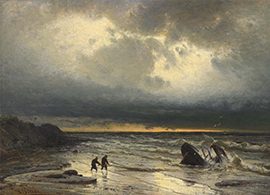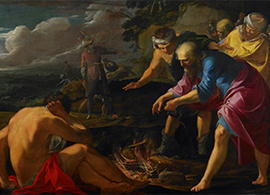Acts Week 11
The World Turned Inside Out Acts 27–28
By Jack Levison
W. J. A. Power Professor of Old Testament and Biblical Hebrew, Southern Methodist University
Read this week’s Scripture: Acts 27–28
18:30

 Enlarge
Enlarge
The Magnetic Pull of Hospitality
S. Gorley Putt, my idiosyncratic senior tutor at Christ’s College, was right: the delight is in the details.
Imagine if you didn’t know the detail that the trip from Myra in Lycia to Cnidus should have taken just a day or two, but Paul’s ship travelled “slowly for a number of days and arrived with difficulty off Cnidus” (Acts 27:7). Without this chronological detail, you’d never appreciate how excruciating it was for Paul to delay his dream of setting foot in Rome, simply because of terrible weather.
Imagine if you didn’t know the detail that the words “end of the earth” in Acts 1:8 aren’t just about geography. Luke lifts these deceptively simple words from Isaiah 49:6, a stunning vision in which an Israelite prophet — and now Paul 500 years later — serves “as a light to the nations, that my salvation may reach to the end of the earth.” Without this literary detail, you’d think Paul was travelling from Jerusalem to Rome rather than, in a holy-spirit-prompted expedition, to the heart of God’s hope for the world.
Imagine if you didn’t know the detail that the Three Taverns, where Roman believers met Paul (28:15), was more than 30 miles south of Rome. Without this geographical detail, you’d think believers from the church in Rome greeted Paul at some convenient spot, a tavern somewhere in the city near where they lived. You’d never know they spent a couple of days, and a chunk of their savings, to welcome Paul in an act of radical hospitality (Acts 28:14–15).
The church — believers in Antioch and Tyre and now Rome — aren’t satisfied simply to invite guests for coffee and danish after the service. The earliest followers of Jesus exercise the magnetic pull of hospitality.
In Antioch, they worship and fast and pray their people into mission, and, when the mission is done, the church in Antioch becomes a place of grace where the missionaries kick up their heels and recover (Acts 13:1–4; 14:27–28).
In Tyre, believers whose counsel and command Paul squarely has repudiated when he continued on to Jerusalem (21:4–5) still exercise vibrant hospitality. Luke recalls wistfully that
[A]ll of them, with wives and children, escorted us outside the city. There we knelt down on the beach and prayed and said farewell to one another. Then we went on board the ship, and they returned home (Acts 21:5–6).
In Rome — south of Rome, really — believers travel miles to accompany Paul and his friends on the last leg of an exhausting journey to the end of the earth. Grueling though it is, the trek ends in the arms of believers, for whom Paul gives thanks and from whom, after months of encouraging others on land and sea, Paul himself “took courage” (Acts 28:15). [Author’s Note 1]
Two Worlds as One
Hospitality may seem an odd focus to our Lectio, since Paul, at journey’s end, quotes the dispiriting words of Isaiah about Israel, which explain why Paul’s countrymen and women resist the good news of Jesus (Acts 28:25–27). They listen but don’t understand. They look but don’t perceive.
Yet Paul does not discount the Jews altogether. Like the man of letters he is, Paul in the book of Acts never forfeits his conviction that the gospel “is the power of God for salvation to everyone who has faith, to the Jew first and also to the Greek” (Romans 1:16). When, at the tail end of Acts, Paul quotes Isaiah 6:9–10, he despairs but is not done in. Many Jews, like Priscilla and Aquila, follow Jesus, and even some right there in Rome “were convinced by what he had said” (Acts 28:24).
Our last glimpse of Paul, in fact, shows him living for two years as gracious host — welcoming all who came to him (Acts 28:30) — hospitable to the core.
The World Inside-Out

 Enlarge
Enlarge
Why then is Paul convinced that “this salvation of God has been sent to the Gentiles; they will listen” (Acts 28:28)? Because in the stories of sailing and a shipwreck, Paul’s world is turned inside-out by Gentiles. That’s what happens when the church reaches the end of the earth. The world changes, yes, but just as important, our world turns inside-out when pagans surprise us by doing the work of salvation.
Philanthropy on steroids. On the last, long, and demanding leg of the journey, before Paul reaches the Three Taverns, who treats Paul right? Julius, a Roman centurion, “treated Paul kindly [philanthropically in Greek], and allowed him to go to his friends to be cared for” (Acts 27:3). Julius was Paul’s philanthropist. Later, when Roman soldiers plan to kill prisoners to prevent them from escaping during the shipwreck, Julius, “wishing to save Paul, kept them from carrying out their plan” (27:43–44).
When they hit land on the island of Malta, who takes them in? Barbarians. That’s what Luke calls them. Barbarians. This word is onomatopoeic — bar bar — reflecting the incomprehensible stuttering of foreign languages, of uncultured people who did not speak Greek. It came to mean much more — foreign and alien people; then rude, vile, crass folk. [Author’s Note 2]
Barbarians, pure and simple, met 276 survivors of a shipwreck with dazzling hospitality. Barbarians “showed us unusual kindness,” extraordinary philanthropy in Greek, yet again. As the survivors rolled ashore on the cool waves of winter seas, the rain and cold descended, so the barbarians of Malta “kindled a fire and welcomed all of us around it” (Acts 28:2).
This was not a theologically astute lot, the sort we might recruit to study theology at SPU. Their theology was, to put it kindly, lacking in nuance. When a viper bites Paul, they figure he is being punished; when Paul survives the bite, they figure him for a god. These are not the shiniest apples in the theological barrel. They are just friendly, generous, philanthropic folk.
Even the highest-ranking citizen, an estate owner in Malta named Publius, proves friendly — with a wallop! He “received us and entertained us hospitably for three days” (Acts 28:7). The us could be Paul and his travelling companions; more likely, the us is the 276 uninvited guests who floated onto their island. Publius houses and feeds them for three days on his island estate. That’s friendly by any standard.
The centurion, the barbarians, and the highest-ranking citizen of Malta have this in common: none is a Jew, none a Christian. Yet all of them are philanthropic. All of them further the work of God, the transport of bringing light to the nations (Isaiah 42:1–7). We’ve seen this before — hospitable pagans — but never in such density as here on the high seas and scattered islands of the Mediterranean. This is kindness on steroids.
Pearls before swine. Paul responds in kind. On the doomed ship, just before daybreak, only hours before the ship breaks on a reef, Paul tells everyone to eat — but not in an ordinary way. “I urge you to take some food, for it will be for you your salvation [Author’s Note 3], for none of you will lose a hair from your heads” (Acts 27:34; emphasis added). Salvation, we’ve seen, can mean physical healing (Acts 4:8–12), and here it means survival. But it’s difficult to read it as survival rather than salvation — that it means both is more likely — in light of what comes next.
Paul now quotes — we might say misquotes — Jesus, who promised, when he taught people not to fear, “even the hairs of your head are all counted” (Luke 12:7). Jesus also told believers who faced persecution, “You will be hated by all because of my name. But not a hair of your head will perish” (Luke 21:17–18). Paul turns this saying inside-out when he applies it, not to believers facing persecution, which Jesus talked about — but to the pagan sailors and soldiers who surround him on the ship.
Then Paul does and says something even more remarkable, something that makes him look an awful lot like Jesus on the night before he went to trial: “After he [Paul] had said this, he took bread; and giving thanks to God in the presence of all, he broke it and began to eat” (Acts 27:35; emphasis added). If I blindfolded you and asked you to listen to these words, you could be forgiven for mistaking them for a description of the last supper:
Then he took a loaf of bread, and when he had given thanks, he broke it and gave it to them, saying, “This is my body, which is given for you. Do this in remembrance of me” (Luke 22:19; emphasis added).
They even sound almost exactly like Paul’s first letter to the Corinthians, where Paul records,
I received from the Lord what I also handed on to you, that the Lord Jesus on the night when he was betrayed took a loaf of bread, and when he had given thanks, he broke it and said, ”This is my body that is for you. Do this in remembrance of me” (1 Corinthians 11:23–24; emphasis added).
The kicker is this: Paul looks just like Jesus, except that Paul is giving the last supper on the ship to pagans, to unbelievers, to the unbaptized. By all rights, this shouldn’t happen. Jesus had said, “Do not give what is holy to dogs; and do not throw your pearls before swine, or they will trample them under foot and turn and maul you.” A late-first-century document called the Didache interprets this command as an order not to give the Eucharist, the Lord’s Supper, to the unbaptized. [Author’s Note 4] Yet Paul does precisely this, or so it seems.
And why not? We’ve already met the slave girl inspired by a snake-spirit, who knows that Paul, Silas, and company “are slaves of the Most High God, who proclaim to you a way of salvation” (Acts 16:17). We’ve already met Apollos, baptized for repentance but not in the name of Jesus, yet burning with the spirit and teaching “accurately the things concerning Jesus” (18:25). Now we meet the pagans who compose Paul’s community. Why not, at earth’s end, turn the Last Supper inside-out and offer it to the community of 276 people, a community of pagans, a church of barbarians, with whom he has waited, grown weary, and wished for good weather? These are his people, whom he has encouraged and guided and taught; like Jesus, he now eats his final shipboard meal together with them.
The heart of salvation. This community, in a peculiar way, exemplifies salvation, as Luke understands it — giving up security, leaving wealth behind, parting with relationships that serve the status quo. Remember how Jesus’ pregnant mother praised God for having “brought down the powerful from their thrones, and lifted up the lowly,” who “has filled the hungry with good things, and sent the rich away empty” (Luke 1:52–53).
Or how Jesus went public in his hometown of Nazareth and claimed to be anointed, like the prophet in the book of Isaiah: “The spirit of the Lord is upon me, because the Lord has anointed me to bring good news to the poor” (Luke 4:18). Jesus’ stories were peppered with the rough edges of poverty, such as the poor man Lazarus, whose only relief comes from the dogs who lick his wounds, and the resplendent rich man who passes him by every day. In eternity, Abraham explains to the rich man in hell: “Child, remember that during your lifetime you received your good things, and Lazarus in like manner evil things; but now he is comforted here, and you are in agony” (Luke 16:25).
Jesus’ journey to Jerusalem ended with the wee man Zaccheus, of whom Jesus said, “Today salvation has come to this house, because he too is a son of Abraham” (19:9–10). Why? Because Zaccheus got the economic gist of salvation and promised, “Look, half of my possessions, Lord, I will give to the poor; and if I have defrauded anyone of anything, I will pay back four times as much” (19:8). This is a startling and disturbing story for those of us who see salvation in purely spiritual terms.
Oddly enough, captain and crew, soldiers and sailors teach us the nature of this salvation. When they abandon hope of being saved, they throw the contrivances of human security — cargo and riggings and tackle — overboard and survive another night (Acts 27:18–20). In the strange economy of Luke’s God, they are en route to salvation.
When Paul sees some of the sailors trying to steal away on the lifeboat, he tells the centurion and his soldiers, “Unless these men stay in the ship, you cannot be saved” (Acts 27:31; emphasis added). So they ditch the lifeboat. In the strange economy of Luke’s God, the ship, free from false security, is now on course for salvation.
No sooner do the nearly doomed sailors and soldiers eat the bread of their salvation than they throw overboard the whole economic rationale for their journey: wheat, prized by the Romans but useless to a ship about to run aground. In the strange economy of Luke’s God, this will to jettison wealth and well-being is salvation.
It’s a strange world on the edge of the earth, at the boundary Christians inhabit between life and death, poverty and wealth, faith and unbelief. Strangely enough, in this, the final leg of the journey, we grasp the heart and soul of salvation, distilled to its pure essence, not from the staid and solid traditions of the church but from sailors and soldiers who share the bread of salvation, from barbarians who warm the lost by a welcome fire, from a rich Roman who devotes his island estate to 276 strangers without a prayer of paying back what they owe. This is salvation — the world turned inside-out — at the end of the earth.
Questions for Further Reflection
- In today’s reading we once again see the theme of hospitality in the book of Acts. Who are some of the unlikely philanthropists that Dr. Levison highlights in Chapters 27-28?
- Chapters 27-28 contain many interesting and minute details about these last legs of Paul’s journey. What stood out to you that you may have glossed over in previous readings? Why do you think this level of detail is included in the narrative?
- Re-read 27:33—38. What does Dr. Levison note as surprising about their meal, and how does the event connect to some of the big themes we’ve seen throughout Acts?
- As our study of Acts draws to a close, spend some time reflecting on what you hope to take away from this important text. What did you learn about God? Yourself? The church? The nature of the Gospel? How does the book of Acts challenge how you live on a day to day basis?
<<Previous Lectio Back to Acts

This work is licensed under a Creative Commons License.





Not the first Lectio I’ve been privileged to participate in, but certainly the first to reveal to me some meanings in Scripture that I’d either overlooked in my previous reading/studying the book of Acts, and/or meanings that were entirely new to me. Marvelous, fantastic. Well done!